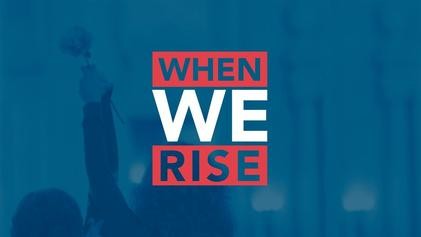“When We Rise,” a miniseries on ABC, tells the tale of three activists during the LGBT civil rights movement. The story focuses on the bigger picture of the movement while trying to showcase a few key characters who walk viewers through history.
“When We Rise” is a four-part, eight-hour-long, scripted miniseries that began airing Monday, Feb. 27, at 9 p.m. and will conclude on Friday, March 3, at 9 p.m.
The miniseries arose from the opportunity some years ago when ABC was looking to showcase something more LGBT-oriented. Dustin Lance Black, who won an Academy Award for Best Original Screenplay for “Milk” in 2008, created and wrote the miniseries.
The miniseries stars Guy Pearce as Cleve Jones and Austin P. McKenzie as his young counterpart, Mary-Louise Parker as Roma Guy with Emily Skeggs playing young Roma and Michael Kenneth Williams as Ken Jones, with his younger self played by Jonathan Majors.
The show does well showcasing its characters alongside a soundtrack that will stick in your head as much as the idea of equality should. After seeing the characters in their main setting before they depart for San Francisco, they leave the world of homophobia, divisiveness, heartbreak, loss, fear of being punished and ignorance that homosexuality is something that can be cured and treated.
Guy finds herself working for the National Organization for Women in San Francisco, while Ken Jones is stationed on Treasure Island retraining naval officers in lieu of their racial remarks and history. Cleve Jones leaves home after telling his father, a physician, that he is gay and his father saying that he could be cured.
The characters set out to try and find bigger and better things in California, land of the most accepting environment at the time. However, that was not entirely the case.
Upon getting to the city, they find that the police are some of the people who are most against them. Guy sets off on her quest to aid women who are affected by violence; Ken Jones attempts to find meaning after losing his lover and comes to grips with his acceptance of his sexuality, and Cleve Jones is just trying to find meaning and find his footing in a new city.
The characters find themselves just barely escaping violent acts against homophobia. From Cleve Jones narrowly evading an incident to Ken Jones making it scratch-free out of a raid of historical gay bar Black Cat Cafe to Guy hiding from police after a demonstration for women against violence turns violent on the police end.
The show depicts the characters’ start in their fight for finding acceptance and equality. The miniseries showcases footage from the era it’s set in with violent reels of homosexual men being beat to clips of homophobic remarks from radicals who believed in the Lavender Scare.
The show’s costumes do a great job submerging the viewer in the 1970s. While there are a fair amount of caucasian characters, the show still depicts characters who are people of color.
The first part of the series leaves our characters all meeting one another at the Black Cat Cafe in an attempt to unite people to combat the heterocracy in San Francisco.
The show has a wide variety of cast with a multitude of opportunities for new characters to appear during the next three episodes. This show has the potential to depict the struggles and hardships the LGBT community had to go through to an audience for a major network like ABC.
The following three parts premiere on March 1, 2 and 3, skipping one day for the time slot for ABC to air President Donald Trump’s address to Congress on Tuesday, Feb. 28.
This show has the potential to better illustrate the community and kinship that inhabits the LGBT community, how their struggles and cries are just as valid as any other minority group and how now more than ever we need to come together. Like Cleve Jones said, this is the place and now is the time to fight back.
Follow David Pujol on Twitter.









